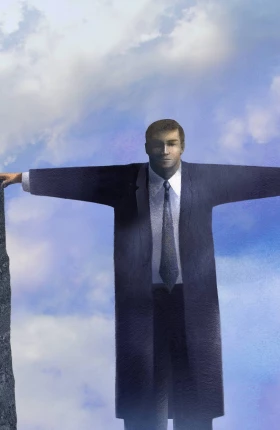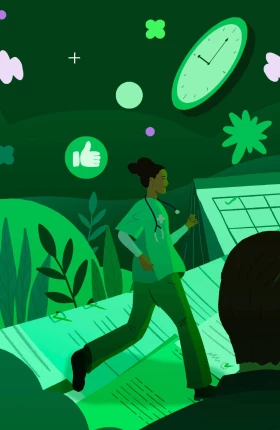This summary article showcases ideas from a recent episode of BCG’s Imagine This… podcast. Alongside BCG Managing Director and Partner Julia Dhar , we explore the coming reinvention of organizations and their structures.
BCG’s conversational AI agent GENE, which cohosts the podcast, generated this summary—with oversight and editing provided by humans.
Imagine this: it's 2030, and the traditional role of the middle manager—an integral position in organizational hierarchies for decades—no longer exists. At long last, the “frozen middle” of management has thawed. This isn't a tale of corporate downsizing or cost-cutting measures gone wild. Instead, it's a story of evolution, innovation, and the relentless progress of technology reshaping the way companies operate.
The So What
The elimination of traditional middle management roles is a transformation that touches every aspect of organizational life. In this future, teams function as self-managing entities, empowered by a combination of their own expertise and sophisticated AI systems that guide decision making, resolve conflicts , and ensure that projects stay on track.
These AI systems aren't just tools; they're integral components of the team, providing real-time insights, performance analytics, and even coaching tailored to individuals’ specific needs and learning styles.
The Drivers of Change. Eliminating middle management roles promises to increase efficiency, agility, and employee engagement. Traditional management layers often slow down decision-making processes and dilute strategic messages.
- By removing these barriers, organizations can become more responsive to market changes and can innovate more rapidly.
- The advent of sophisticated AI technologies has enabled this shift by permitting AI to take on tasks such as supervision, performance management, and some aspects of leadership development.
Efficiency and Innovation. The direct connection between the executive suite and frontline employees fosters a culture of accountability, empowerment, and innovation.
- Equipped with real-time data and AI insights, employees can make informed decisions quickly, leading to significant gains in efficiency.
- Without middle management to veto proposed actions, more ideas can proceed from the drawing board to execution, enabling the company to advance in new and unexpected directions.
Employee Satisfaction and Talent Development. One major benefit of this new organizational model is its likely positive impact on employee satisfaction.
- Freed from micromanagement, employees can take ownership of their work, resulting in stronger engagement and greater job satisfaction.
- On the other hand, removing middle management from the corporate hierarchy—and thereby closing traditional paths to leadership—poses challenges related to career progression and talent development.
- Companies must therefore reimagine how to identify, develop, and promote talent within the new framework.
The Role of AI. AI is at the heart of this transformation, but its role extends beyond automating tasks.
- AI systems can provide personalized coaching, facilitate team dynamics, and even help shape organizational culture . However, this reliance on technology also presents challenges.
- Ensuring that AI systems are fair, transparent, and aligned with company values is crucial.
- Leaders must also be vigilant about maintaining the human touch in their organizations, to ensure that technology enhances rather than replaces human connections.
What I’m arguing is we never really set that intermediary role up for success. It was never clear how they were going to do what we expected them to do—and then every time they failed, we continued to be surprised.
Now What
As the corporate landscape evolves toward a future without traditional middle management, CEOs can take several actions to prepare their organizations for the new era:
1. Embrace AI and technology. Invest in
AI systems
and technologies that can automate supervision and performance management tasks.
- Ensure that these systems are designed with transparency and fairness.
- Align these systems and your use of them with your company's values.
2. Foster a culture of self-management. Encourage employees to shift their mindset from hierarchical control to self-management and accountability.
- Provide training and resources to help teams adapt to this new way of working.
3. Redefine career progression.
Develop new pathways
for career advancement that don't rely on traditional managerial roles.
- Focus on skill development, cross-functional projects, and leadership opportunities that encourage employees to grow and contribute to the organization in meaningful ways.
4. Cultivate interpersonal connections. While
leveraging AI for efficiency
, bear in mind the importance of the human touch.
- Ensure that technology enhances human interactions rather than replacing them.
- Foster a culture of collaboration, empathy, and personal development.
5. Monitor and adapt. Regularly assess the impact of these structural changes on your organization’s performance, culture, and employee satisfaction.
- Be prepared to adapt your strategies as needed to ensure the success of this transition.
Leadership by Design: Navigate the complexities of today’s leadership and management environment.
Julia Dhar founded and leads BCG’s Behavioral Science Lab and is a member of the firm’s global change management leadership team.
You can find Imagine This... wherever you get your podcasts.











